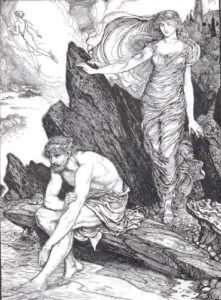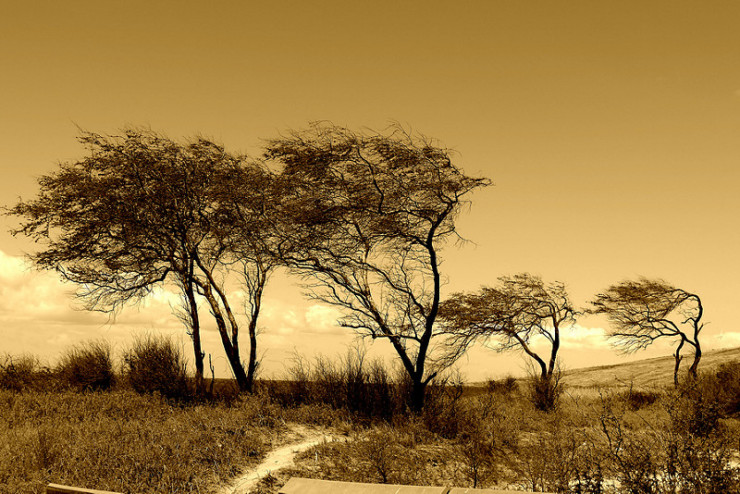Over the centuries, the epic poems The Odyssey and The Iliad by Homer have been translated scores of times. The English translators have included George Chapman, Thomas Hobbes, Alexander Pope, William Cowper, William Cullen Bryant, William Morris, Samuel Butler, Padraic Colum, T.E. Lawrence, W.H.D. Rouse, Robert Fitzgerald, Richmond Lattimore (the translation I first read), and Allen Mandelbaum, among many others. The most recent English translation was published by Oxford University Press in 2014.
In other words, Homer has lasted. And with good reason. The story of the siege and fall of the pf the city Troy and the (mostly) seagoing wanderings of Odysseus still captivates and enchants. And amid the sounds of battle before Troy and encounters with witches, sirens, and various monsters are several very different love stories, including Menelaus and Helen and Odysseus (or the Roman Ulysses) and Penelope.
It was the love story elements that attracted our Twitter poetry party participants on Dec. 10. Here is Part 2 of the compiled poems (you can read Part 1 here).
The Odyssey of the Wooded Isle
By @Doallas, @lauralynn_brown, @llbarkat, @lwlindquist, @SoniaJoie, @lanearnold, @SandraHeskaKing, @pathoftreasure, @BethanyR_, and @Nelronnie. Edited by @gyoung9751.
My own black ship

Odysseus and Calypso
My own black ship I chose to moor alone
with wisps of willow, wound with a silver wand
frozen silver, melted black.
And I, stranded, in the arc of your arms,
chosen sliver, given back.
If the willow weeps black,
I will gather its tears upon my tongue,
the sound of dipping oars,
dripping oars, and your voice carrying,
the ripping oars cut through the night,
your voice a whisper.
Weep for the willow;
it has lent its tears to you.
Your voice sings me rivers deep.
And I, stranded, in the arc of your arms,
bid you, speak not of willows weeping
nor black poplar nor mooring alone.
Why is the willow’s only thought of weeping?
Her strands, long, strong, wait upon the braid.
Braid we make, of words;
braid me down to the seabed strand.
Always changing, always rowing,
the wand it has its way.
Strands of willow for my pillow:
can a ship moor upon a pillow?
The willow bough,
the anchor loosed,
unmoored.
Alchemy and mischief
There is alchemy in your eyes,
eyes of gold and willow,
a narrow entrance opening from the sea.
A narrow entrance opening from the sea
makes mischief of our plans. Make of me
your narrow entrance, to the wide, wide sea.
There is mischief in you yet,
a soft mischief. I hear the Muse within it.
Before I speak I will lay by waters;
let my words steep, steep beside still waters, as
unanchored souls sip from the sea.
If you wrap me about your waist,
how can we not make our way home?
Make me your mast.
Catch the sea
Catch the sea in your hand.
I’ll drink beside you, pillowed
in the curve.
I’ll drink from your hand;
you are my silver bowl.
And if you remember,
then we can go home.
Remember to
look to yourself; remember
what I told you: a night at sea,
unmoored, yet not weeping
for more silver or gold or even lips
retouched in silvered light.
Unveil these eyes;
search for words unspoken.
Move me as nothing
I have ever seen.
Make my veil your sash;
each night unwind
and spell your promise
ever more divine.
Olive and wild olive
Olive and wild olive—a thicket proof
against the stinging wind.
A shield of olive, too.
Save me, save me from the storm.
Olive smooth, the veil, the sail:
weave me a veil of olives.
Anchors unspoken
We shine, like water, anchors unspoken.
Unwoven, forgotten, the wooded forest glides
in the middle of the sea.
Poplar forests in the middle of the sea
hold a silver, braided mystery.
Green herons pick up the silver braids of waves.
What mystery is this?
The mystery of unveiling that
anchors me in poetry.
And I will always be anchored
in your time, your song,
anchored in your poetry.
Photo by John Morgan, Creative Commons, via Flickr. Post by Glynn Young, author of the novels Dancing Priest and A Light Shining, and Poetry at Work.
__________________________

“I require all our incoming poetry students—in the MFA I direct—to buy and read this book.”
—Jeanetta Calhoun Mish
- Longfellow’s “Paul Revere’s Ride”: Creating a National Legend - April 17, 2025
- Poets and Poems: Katie Kalisz and “Flu Season” - April 15, 2025
- Poets and Poems: Michelle Ortega and “When You Ask Me, Why Paris?” - April 10, 2025

Will Willingham says
Another great collection, Glynn. Thanks for what you do with these. 🙂